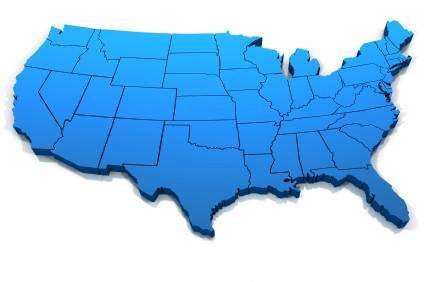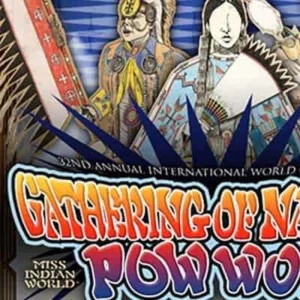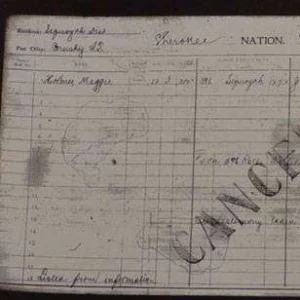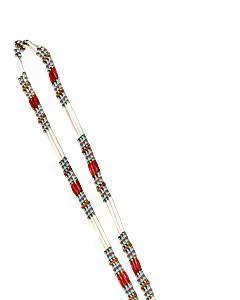DO YOU LIVE IN A NATIVE AMERICAN STATE?
State Name Origins
By Jamie K. Oxendine, Lumbee/Creek
Editor, PowWows.com
Director, Black Swamp InterTribal Foundation
PRELUDE
Most Americans have no concept of the origin history of their state or the state they live in and this includes the knowledge of the origins of the state name. Most of our state’s names have origins in Native American Languages. There are many debates on these origins as each name may have more than one language base as well as have bad interpretations from the European Languages of English, French, Spanish, Dutch, Russian and more. The other major debate is the spellings of the original words. The earliest spellings come from the closest concept of phonics and pronunciations as known by the languages that first encountered the Native American word. It was very common for the Europeans and later Americans to gravely miss pronounce many Native American words and also miss-understand Native American meanings of the same words. Often times the very poor interpretation of Native American words by both the Europeans and later Americans led to many words and many spellings for the same thing.
Just one example of how confusing this can be is the many pronunciations and spellings there have been for the Tribe and state known as Iowa:
The Iowa Tribe has been known as the Aiaoua, Aiaway Ainovines , Aiodais, Aiouez, Ayaabois, Ayoes, Ayouos, Ayous, and Yoais among the French, as the Ajoues among the Spanish, as the Ioways and Iowaas among the English, as the Aiaouez, Aiauway, Aiaway and Aieway among early Americans and finally as the Iowa as accepted for the Tribe and territory by 1835.
The list of state name origins below is far from definitive as research indicates that there can be several origins of each word from more than one Tribe as well as several different interpretations of Native American words by the Europeans and Americans.
*Greatly Debated
STATE NAMES
Alabama from the name of the Alibamu or Albaamu Tribe with origins among the Creek meaning town and Choctaw meaning thicket clearers and vegetable gatherers and cutters of medicine plants.
Alaska from the Aleut word alakshak meaning peninsula or great land.
*Arizona from the Pima and Papago word arizonac meaning place of small springs or little spring place as well as from the Spanish interpretation of the Aztec arizuma.
Arkansas from the name of the Quapaw Tribe from other neighboring Native American Nations as well as bad French interpretation of the word acansa meaning downstream place.
Connecticut from the Mahican word quinnehtukqut meaning beside the long tidal river.
*Idaho from the area tribes meaning gem of the mountains as told by early settlers of the territory but actually time showed that it was a created word by a mining lobbyist from a possible Shoshone word and possible Plains Apache word idaahe.
Illinois from the French interpretation of Algonquin Miami iliniwek and ilenweewa meaning warriors and tribe of superior men as well as an adaptation of Odawa ilinouek.
Indiana meaning Land of Indians as given by the Americans for the many tribes that lived there and that were moved there before Indiana became a state as it was the real first Indian Territory established by the United States.
Iowa from the name of the Ioway Tribe, but also possible corruption of the word Kiowa as used by the Meswaki Nation for the Tribe that lived south of them on the Iowa River to describe those that wander.
Kansas from the name of the Kansa or Kaw Tribe meaning people of the south wind.
Kentucky from the Wyandot word kahtentah and the Lenape word kahntukay and the Haudenosaunee (Iroquois) words kentahten, kantake and ketakeh meaning land of tomorrow describing the area that was a mutual and neutral hunting ground for many Tribes.
Massachusetts from the Algonquian Narragansett messatossec, massawachusett, and massachuseuck of the Massachusetts Tribe meaning people of the Green Hill.
Michigan from the Anishinaabe micigana, meicigama or meshi-gami meaning great waters or great lakes.
Minnesota from the Lakota word minisota meaning sky tinted waters for the many lakes.
Mississippi from the French interpretation of the Anishinaabe and Algonquin words for the river misissipi, messipi and misiziibi meaning Great River.
Missouri from the Iliniwek Missouri Tribe wimihsoorita meaning owners of big canoes. Other origins include the Lakota word for the Missouris Tribe meaning town of large canoes or wooden canoe people and even river of the big canoes.
Nebraska from the Oto word nebrathka, the Omaha-Ponca nbdhaska, and the Ioway-Otoe nbraske meaning flat water or flat river for the Platte River.
New Mexico from mexitli the Aztec God and named by Spain for its new territories north of the Rio Grande River.
North Dakota & South Dakota named for the Territory of Dakota from the Dakhota (Dakota) Tribe and possible the Santee dakhota as well as possible Omaha-Ponca dakkudha.
Ohio from the Haudenosaunee word oheo or ohioway for the confluence of the Alleghany and Ohio Rivers meaning good river and beautiful river.
Oklahoma from the Choctaw words okla for people and humma for red meaning land of the red people.
*Oregon from the possible French interpretation of Algonquin Native words wauregan and ouregon for the Oregon River (what would be called the Columbia River) and maybe French word ouaricon-sint for the Wisconsin River.
Tennessee from the Aniyunwiya (Cherokee) word tenasi or tanasi for the Little Tennessee River and one of their main villages that at one time was the capital of the Nation.
Texas from a Caddo word teyshas meaning friends or allies.
Utah for the Ute Tribe meaning high up people and later poorly translated people of the mountains as they were sometimes referred to by the Apache from the word yudah and yuttahih.
Wisconsin from the Anishinaabe words wishkonsing and miskwasiniing as well as Miami meskonsing with various meanings from red place, red stone place and place of the beaver or has also been attributed to the French interpretation ouisconsin meaning grassy place.
Wyoming from the Algonquin Lenape word maughwauwama meaning large plains at the big flat river as their word for the Wyoming Territory that reminded them of the same area of the Wyoming Valley in their homeland of Pennsylvania.
CONCLUSION
As one can see, this is just another example of our rich Native American Culture in the United States. This greatly extends to names of regions, counties, cities, streets, lakes, mountains, rivers, and so much more. We are a country of Native American word origins.
This is also just one small study into the linguistics nightmare of a short list of words with Native American origins. One can see that the various ways of pronouncing and spelling a Native American word over time has created much debate on where and when the original names of our states came.
BIBLIOGRAPHY
Afable, Patricia O. & Beeler, Madison S. 1996. Place Names. In Languages. Ives Goddard, Ed. Vol. 17 of Handbook of North American Indians. William C. Sturtevant, Ed. Washington, DC: Smithsonian Institution.
Bright, William. 2004. Native American Place Names of the United States. Norman: University of Oklahoma Press.
Campbell, Lyle. 1997. American Indian Languages: The Historical Linguistics of Native America. Oxford: Oxford University Press.
Chamberlain, Alexander F. 1902. Algonkian Words in American English: A Study in the Contact of the White Man and the Indian. The Journal of American Folklore, 15, (59) 240-267.
Crowley, Terry. 1992. An Introduction to Historical Linguistics. Oxford: Oxford University Press.
Cutler, Charles L. 1994. O Brave New Words! Native American Loanwords in Current English. Norman: University of Oklahoma Press.
| DeMallie, Raymond J. 2001. Plains. Vol. 13 of Handbook of North American Indians. William C. Sturtevant, Ed. Washington DC: Smithsonian Institution.Flexner, Stuart B. & Hauck, Leonare C. Eds. 1987. The Random House Dictionary of the English Language. New York: Random House.Guyton, Kathy. 2009. U.S. State Names: The Stories of How Our States Were Named. Nederland, CO: Mountain Storm Press.
LeClaire, Nancy, & Cardinal, George. 1998. Alberta Elders' Cree Dictionary. Earle Waugh, Ed. Edmonton: U of Alberta Press. |
Nyholm, Earl & Nichols, John D. 1995. A Concise Dictionary of Minnesota Ojibwe. University of Minnesota Press.
Arabic Keyboard Online – Virtual Arabic Keyboard
Rankin, Robert. 2005. Quapaw. In Native Languages of the Southeastern United States, eds. Heather K. Hardy & Janine Scancarelli, Eds. Lincoln: University of Nebraska Press.
Rhodes, Richard A. 1985. Eastern Ojibwa-Chippewa-Ottawa Dictionary. Trends in Linguistics Documentation 3. Berlin: Mouton.
Rhodes, Richard A. 2002. Multiple Assertions, Grammatical Constructions, Lexical Pragmatics, and the Eastern Ojibwa-Chippewa-Ottawa Dictionary. In Making Dictionaries: Preserving Indigenous Languages of the Americas. Frawley, Hill, and Munro, Eds. Berkeley and Los Angeles: University of California Press.
Sanders, Thomas E., & Walter W. Peck. Eds. 1973. Literature of the American Indian. Berkeley: Glencoe.
Sturtevant, William C. Ed. 1983. Handbook of North American Indians. Washington, DC: Smithsonian Institution.
Last Updated on March 5, 2024 by Jamie K Oxendine





Dang Weaver
says:Read the American State Papers, the Mississippi Territorial Archives, and don’t forget Worchester v. Georgia in 1832 and let John Marshall tell everyone about the History of the United States from a 68-year old who lived during the time history was in the making.
If he leaves out things like the American Revolution, the Creek War, the Battle of New Orleans, etc. don’t be surprised – just look it up and ask why is that.
Darby Weaver
The Tribal Leader
Charlotte
says:Good morning. ….can you tell me if DNA testing by ancestry .com really works? I hesitate spending that much to come up disappointed. ..I’ve been told I’m part Cherokee and I’m a member of a tribe in Alabama. .they researched my ancestry. .I would just like proof with blood quantum. ….
Paul G
says:Read our article about DNA testing – https://www.powwows.com/know-dna-testing-family-history-research/
Carol Lee
says:Looking for info about the Cumbo name. We were from N. C. This was such an interesting article. Wado!!!!!!
Running Doe
says:Cherokee North Carolina, ,up from grandfather mts. in Tenns. wado for sharing
Steve Howard
says:I wish they’d pick a name from any of the numerous nations in Washington State and rename it. May as well call it genocide with it’s current name.
Karen
says:They didn’t include California. Maybe they should do more research.
Jamie Oxendine
says:Karen the paper is about the origin names of the states, not the people that lived in the area. The word “California” is not a Native word…it is Spanish.
Joyce Richardson
says:I live in Florida and in South Florida for years and went to school and befriended several members of the Seminole tribe. Why is Florida not listed. Most of the tribe live in Big Cypress, and they have a reservation in Dania/Hollywood.So why is Florida not listed????
Jackie bagley
says:South Carolina has many tribes. The Catawba Indians are the only federal tribe.
Jamie Oxendine
says:Joyce, the paper is about the origin names of the states, not the people that lived in the area. The word “Florida” is not a Native word…it is Spanish.
Alyssa Harford
says:It is nice to see how much Native American culture and language is embedded in US history. I am proud to see my home state listed above.
Quinn O'Connor
says:Great informative website. I never knew the origins of many of the states listed above. Even googling the answers doesn’t give as much information in one single post.
Victoria Reamer
says:I’m from the Ohio area and was familiar in passing with the origin of the name, but I had no idea so many of the states had names originating in Native American language.
I am curious about the names with asterisks that are said to be debated; they seem very similar to the possible origin words, so why are they still debated? Do people claim the name origin is from elsewhere?
Alyssandra Schwind
says:This was an incredible article Professor! It was also a very interesting read. It boggles my mind that I am just now learning this information. It makes me wonder, why don’t we learn this information and the correct information about your culture in high school as well in grade school?
As Molly stated above my post, this truly was an eye opening article and thank you for this!
Brianna Potts
says:This was a really interesting read! I’m glad I got the chance to learn the origins and meanings of these states names.
C Yokom
says:When I was in elementary school, I remember learning this same fact about Michigan’s name. I don’t believe they taught it as an Anishinaabe word, but directly attributed it to Potawatomi. Either way, I did some digging after reading that and have an even better understanding of the many cultures that comprise the Anishinaabe Nation. Thanks for sparking my curiosity!
Molly LaBadie
says:Most of these names are geographically and historically correct and as you had once stated in class Native Americans are very matter-of-fact and these names mirror that concept.
Thank you for this eye opening article!
SoulSpirit
says:I noticed no tribes were mentioned concerning Mississippi when history tells us was lively inhabited by Chickasaw tribe I am 1/4 Chickasaw
SoulSpirit
says:*heavily not lively heavily inhabited by Chickasaw tribe
Jamie K. Oxendine
says:As one might notice what eventually became the name of a State was not necessarily a word or term from the people of said area or territory. This is common not only here in North America, but across the globe.
Alvelia Farmer
says:I never knew how deeply rooted the Native American language was in our everyday society and culture. Very interesting and informative. Thanks for enlightening me.
Nate Zona
says:The fact that so many names/places in this country have been stolen from the natives is terrible. Even more disturbing is the ignorance of American culture towards this fact. Thank you for posting this, I’m gonna mention this around my friends and family any chance I get.
Douglas Spirit Bear Neely
says:Interesting how all the different European interpretations came into play in naming the states, rivers, lakes, and places across this land.
Mark Chase
says:It is truly fascinating how much of our contemporary culture stems from Native American history, especially with the names of familiar locations. It is also unfortunate that Americans today do not fully appreciate the origins of their homes and just how great of a role Native Americans played in shaping this nation’s legacy. Lastly, it has become more apparent that language barriers prevented the settlers and the natives from fully understanding one another, directly leading to the various spellings and interpretations of Native American words.
Noah York
says:I have often wondered where some of the states got their names… Arkansas was one of them. As a child, I was confused as to why we pronounced the end of the word Kansas, but not Arkansas. I later thought it was a French pronunciation of Arkansas…then I wondered why the French did not pronounce Kansas the same way. What a mess. Now I see what happened. Glad to finally know!
Lee Slusher
says:It is very interesting to see how many states actually had there names originate from Native American words and how badly the new settlers would misinterpret these words.
Dove of Many Tears
says:Awesome article.Thanks I enjoyed it very much.
Gail
says:found this very interesting and informative. thanks
Rachel
says:I agree with Rebecca Hunt Locklear. You should try to have this important data on PBS or the History Channel. There is so much misinformation about Native American History.
Jay Langley
says:I was born an raised in Florida living within a mile of Timucan secred sites. I thought I was well informed about the Timucan, Miccosukee and Seminole. Now I live in very north west Georgia which was really the land used by the Creek tribe. Living here I have connected with tribal elders and have learned about my own heritage. I am still learning and have a long way to go. GG Great grand mother along with her family and up one line of the family was/is Cherokee. Further back up my mother’s line is Algonquin and Huron. It is good to be Red and better to know about it.
Barbie
says:I’m actually Southern Paiute on my grandfather’s side he was born in the 4 corner area but left when he was a teenager and never went back. My daughter and I usually go up to Atmore, AL for the Poarch Creek Pow Wows which they have Thanksgiving weekend. You may have heard of them (Wind Creek Casino & Hotel). Several of my friends here are Miccosukee and Creek. They are in the process of developing land that has been in dispute with the State for several decades. With grant money and lots of hard work they should be up and running in about a year.
Barbie
says:The Original habitats of what is now called Florida were:
The Apalachee tribe
The Calusa tribe
The Choctaw tribe
The Creek tribe
The Miccosukee tribe
The Tequesta, Jeaga and Ais tribes
The Timucua tribe
The Seminoles were not originally a single tribe. They were an alliance of Northern Florida and Southern Georgia natives.
Many of these tribes are still active today.
Peg
says:where is a livable reservation close to me? Nashville tn. Thank You
Paul G
says:Take a look at our Native American Tribal Directory.
darcy belland
says:yes befor immigrants reformed this land.
Jamie K Oxendine
says:The term “Florida” is of Spanish origin and means “flowery.” It is said that comes from “Pascua Florida”, meaning “feast of flowers” referring to Easter time when Ponce de Leon came upon the land on Easter in 1513. He refered to the land as “La Florida.”
Lynn
says:There was an old book written about a utopian society named Florida. Florida was supposably named after the book. california was also named after a story of a utopian society.
Chari Mercier
says:I may have misspelled Miccasukki, so sorry about that one! Hope someone can correct that for me, but I hope you all know what tribe in Florida I was talking about. Thanks! Chari :}
Chari Mercier
says:I loved this article about some of the states that originated from Native American tribe words, and have lived in 5 of them–Arkansas, Alabama, Texas, Kansas, Missouri. I currently live in Florida which the home of the Miccasukki and Seminole Native American tribes. But, I didn’t see Florida on the list of states, so I’m wondering if Florida’s state name originated from a Native American word or not. I do have a small amount of Cherokee thanks to my dad’s side of the family. So, I’m always interested in anything related to Native American history and legacies. Chari 🙂
Rebecca Hunt Locklear
says:I really like this one a lot Jamie. This would be great for PBS or the History Channel. I learned a great deal from reading this especially in the part about there are so many words that could be origins of the original name.
Michelle
says:Correction on the word for Wisconsin. There are 2 ideas of where the word Wisconsin comes from in the Anishinaabe/Ojibwe language. Beaver is “Amik” I think the word your looking for is the word for muskrat “wazhashk” place of muskrat lodges is what I was told by one fluent speaker. Wazhashkwiish is muskrat lodge “wazhashkwiishing” place of muskrat lodges. Another speaker told me it was “wiishkoonsing” meaning place that is grassy, marshy or cattails.
Ally
says:Jamie, Thanks for this awesome article. I loved reading about the origins of so many state names. This was a really good read…